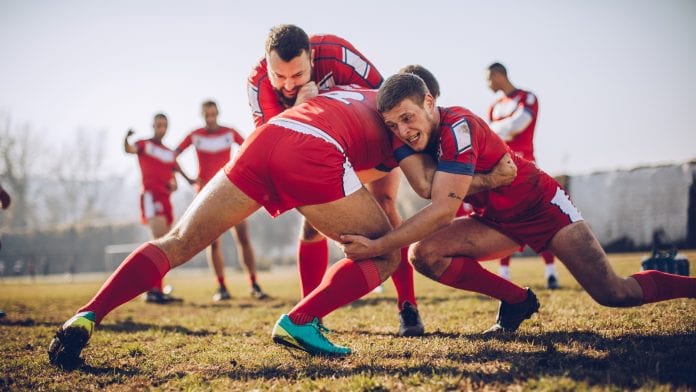
A study of top UK rugby players has identified a new method of accurately diagnosing concussion using saliva which will help develop the first non-invasive test for concussion.
The groundbreaking three-year SCRUM (Study of Concussion in Rugby Union through MicroRNAs) study, led by the University of Birmingham and carried out in collaboration with Rugby Football Union (RFU), Premiership Rugby, and Marker Diagnostics, has shown for the first time that specific salivary biomarkers can be used to indicate if a player has been concussed.
The team carried out previous research which identified that the concentration of specific molecules in saliva changes rapidly after a traumatic brain injury. This led to the team’s current research to establish if these ‘biomarkers’ could be used as a diagnostic test for sport-related concussion.
The research has been published in the British Journal of Sports Medicine.
Testing biomarkers in saliva
The team used DNA sequencing technology to test biomarkers in saliva samples from 1,028 professional men’s rugby players competing in English rugby’s top two leagues – the Premiership and Championship.
As well as showing that specific salivary biomarkers can be used to indicate concussion, the findings also demonstrated that these biomarkers provide further insights into the body’s response to injury as it evolves immediately after trauma, to several hours, and even days later.
The study provides a new laboratory-based non-invasive salivary biological concussion test that could be used to reduce the risk of missing concussions in sport and wider settings such as military and healthcare.
First author Dr Valentina Di Pietro, of the University of Birmingham and NIHR SRMRC, said: “Concussion can be difficult to diagnose, particularly in settings such as grass roots sports where evaluation by a specialist clinician is not possible. Consequently, some concussions may go undiagnosed. There are also concerns regarding the long-term brain health of those exposed to repeated concussions.
“A non-invasive and accurate diagnostic test using saliva is a real game changer and may provide an invaluable tool to help clinicians diagnose concussions more consistently and accurately. In professional sports, this diagnostic tool may be used in addition to current head injury assessment protocols and return to play evaluation to ensure the safety of individuals.”
The researchers highlight that for community sport, these biomarkers may provide a diagnostic test that is comparable in accuracy to the level of assessment available in a professional sport setting.
Expanding the test
Marker Diagnostics, a subsidiary of Swiss biotechnology company Marker AG, is in the process of commercialising the patented test as an over-the-counter test for elite male athletes, and has obtained a CE Mark for test, which has been named MDx.100.
The team now aims to collect further samples from players in two elite men’s rugby competitions in order to provide additional data to expand the test and develop its use to guide the prognosis and safe return to play after concussion and to further establish how it will work alongside the HIA process.
The team will present their findings and planned next research steps at the World Rugby Laws and Welfare Symposium to be held later this month and are currently carrying out additional studies to validate and expand the test for use in different groups that were not included in the SCRUM study, such as women, young athletes, and community sports players.
Author Dr Matt Cross, Head of Science and Medical Operations at Premiership Rugby, said: “We would like to thank our clubs and all of the players for volunteering to be part of this very important research project. The findings from the study are clearly promising and highlight the potential for salivary biomarkers to further support clinical decision making and the accurate identification and diagnosis of concussion in a range of different sporting and non-sporting settings.
“Premiership Rugby and the Premiership clubs support a number of player welfare focused research projects, and we are looking forward to continuing to collaborate and support further research in the next phase of this specific project from 2021-22 onwards.”
The research is part of the REpetitive COncussion in Sport (ReCoS) research programme being led by the University of Birmingham through the National Institute for Health Research’s Surgical Reconstruction and Microbiology Research Centre (NIHR SRMRC) based at University Hospitals Birmingham NHS Foundation Trust (UHB).









